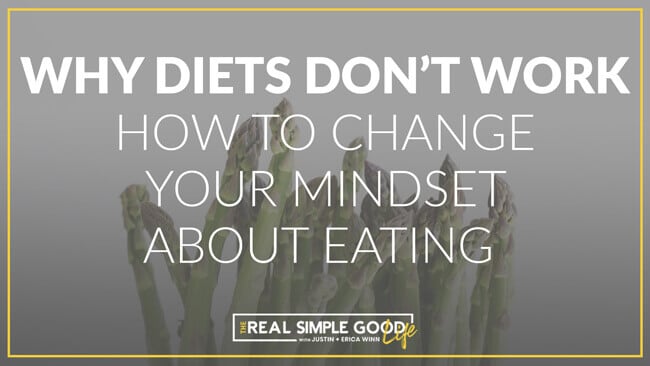Why diets don’t work
This answer is really simple when you think about it. Most diets focus on weight loss, which is not sustainable for your body. It goes against thousands of years of evolution and our ingrained survival mechanism. When we restrict what we eat and create constant hunger, our bodies react by producing hormones that are designed to make sure you eat and also make food taste better. While these signals from our body can be ignored temporarily, they can’t be dismissed forever.
Other reasons diets don’t work
1. A one size fits all approach
Everyone has a unique background, body chemistry and overall health goal. Therefore, the strict approach outlined by most diets may work for some but not for others. While some portion of a diet plan might work for most, everyone needs to tailor their eating plan to their own goals and needs.
2. Most diets are designed to be temporary
Diets, by design and definition, are temporary food plans. Most are designed to achieve short-term weight loss. On a diet you may lose weight initially, but most people gain the weight back (and more) in 1 to 5 years. It’s pretty easy to see that a short-term diet approach isn’t meant to be sustained over the long-term.
3. They can damage your relationship with food
Overly restrictive diets can take all of the pleasure out of eating delicious food. Instead of focusing on feeding your body the proper nutrients, you’re obsessing over counting calories and macros. You’re wondering how many points a food has or choking down another “green smoothie”. Diets can take away the satisfaction your mind and body crave from eating the proper food.
4. A focus on weight loss vs. health
Let’s be honest, most people are dieting to lose weight. To look “thin”. To fit into an “ideal” body type. The problem with this is that you can be thin and still be unhealthy. Depending on your body-type and genetics, you may not have an ideal BMI. By focusing solely on weight loss, you might be depriving your body of the proper nutrients it needs to thrive and be healthy.
5. Diets don’t address the “why”
This should probably be #1, because it might be the most important point. Diets only focus on the end result – losing weight. But the missing aspect of most diets is the examination of why you want or need to lose weight. Most diets don’t answer these important questions:
Why do you want to lose weight?What are your overall health goals?How did you become overweight or develop condition X,Y,Z?Did you have emotional trauma around eating?How is your self image shaping your eating goals?
How to change your mindset about eating
Now that we’ve explored some aspects of why diets don’t work, let’s dig into some ways to change from the short-term “diet approach” to a long-term approach to healthy eating.
1. Clarify what your goals are and why
So you want to lose some weight – that’s great. But why do you want to lose weight? Are you considered obese and want to reduce your risk of developing prediabetes? Do you want to be able to be more active to keep up with your kids? Do you just want to feel better and more confident? Defining your why is important in setting and sticking to a long-term healthy eating approach. It gets the ball rolling and gives you something to keep you going when you have a setback or stumble along the way – which is inevitable (see #4 below).
2. Focus on health
In order to sustain healthy eating choices, it’s important to focus on health vs. weight loss. Weight loss is a short-term goal, overall health is a long-term approach you must stick with to achieve. If you think about your health as something you need to manage for the rest of your life, you can get away from the yo-yo dieting and instead focus on a longer term, more practical plan for eating well.
3. Make long-term choices
Eating for the long-term is a total mindset shift from a typical diet. Most diets focus on restricting what you eat for a short period. Instead of this, why not focus on what will help you achieve optimal health for the rest of your life? Using this mindset will help you define what is sustainable for you. By making long-term choices, you can avoid the “restrictive” feel of most diets. You can learn what works for you and be more intuitive about what your body needs and craves. It will help put things in context and shape long-term habits that will be the foundation for achieving your health goals. Another mindset shift to adopt is to forget about the notion of “failure” when it comes to healthy eating. If you focus on overall health for the long-term as noted in #2 above, you can accept the occasional setback or indulgence in stride. You can enjoy the holidays or a birthday party knowing that having a dessert won’t ruin your “diet”. Simply knowing that an occasional indulgence fits into your long-term health plan will create a more positive mindset. Any guilt around food choices should be temporary. You can always make better decisions tomorrow – choices that support your long-term health goals. Forget about any bad choices and move on.
5. Adjust and recalibrate
Over the long-term, you must examine what is and isn’t working for you and adjust accordingly. Changes in health, life circumstances, aging, etc. can all change and shape your overall health goals. You may find that restricting certain foods isn’t working for you and you want to add them back in on occasion. You need to constantly examine your goals and actions to see if they are in alignment. If not – adjust and recalibrate.
Some other posts you might like
Getting Support When You Transition to Healthy EatingHow to be More ActiveHow to Eat Healthy to Stay Healthy for the Long-TermHow to Start Exercising
How do you want to change your mindset about eating?
So, what is ONE THING you want to change about your approach to healthy eating? Comment below and tell us what you think will help you the most. If you enjoyed this post and found it helpful please be sure to share it! Tag us in your healthy eating posts on Instagram @realsimplegood and #TheRSGLife. We can’t wait to see what you’re up to! SHARE IT NOW OR PIN IT FOR LATER!


